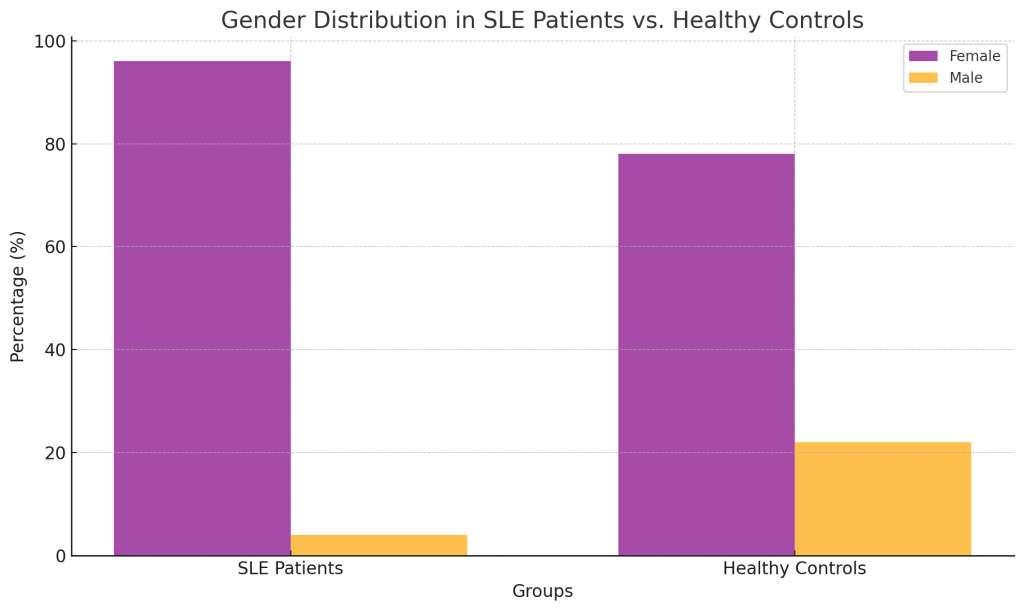Table of Contents
ToggleIntroduction
Lupus, a chronic autoimmune disease, affects millions of people worldwide, causing a wide range of symptoms that can significantly impact daily life.
From debilitating fatigue and joint pain to skin rashes and organ inflammation, living with lupus poses numerous challenges both physically and emotionally.
However, it is essential to note that with effective management strategies in place, individuals with lupus can still lead fulfilling lives.

Lupus: Overview and Daily Life Impact
Lupus is a complex condition in which the body’s immune system mistakenly attacks its own tissues and organs.
This autoimmune response can manifest in various ways, affecting different parts of the body such as the skin, joints, kidneys, heart, or brain.
Common symptoms include fatigue, joint pain and swelling, fever, skin rashes (often worsened by sun exposure), chest pain upon deep breathing or coughing due to lung inflammation.
The severity and frequency of flares vary from person to person. Consequently, managing daily activities becomes challenging due to physical limitations caused by pain or fatigue.
Effective Lupus Management for a Fulfilling Life
While lupus may present ongoing challenges for those affected by it, managing the condition effectively is paramount for leading a satisfying life.
The key lies in understanding how to strike a balance between self-care practices—such as adopting healthy lifestyle habits and seeking support—and actively participating in activities that bring joy and fulfillment without exacerbating symptoms.

Understanding Lupus Management
Explaining the Nature and Symptoms
Lupus is an autoimmune disease that occurs when the immune system mistakenly attacks healthy cells and tissues in various parts of the body.
The exact cause of lupus is still unknown, but it is believed to be a combination of genetic, environmental, and hormonal factors.
Lupus can affect almost any organ or system in the body, including joints, skin, kidneys, heart, lungs, brain, blood cells, or even the digestive tract.
Some common signs include extreme fatigue or weakness, joint pain or swelling, rashes on the face (often referred to as the butterfly rash), sensitivity to sunlight or other forms of light, hair loss or thinning.
Other symptoms may include fevers without an apparent cause, chest pain while deep breathing (pleurisy), headaches or migraines, mouth ulcers that are painless but persist for weeks at a time.

Need for a Comprehensive Treatment Plan
This plan usually involves a multidisciplinary approach involving rheumatologists (specialists in autoimmune diseases), other specialists depending on affected organs (such as nephrologists for kidney involvement), primary care physicians/general practitioners (GPs) keeping track of overall health.
The primary goal of treatment is to control inflammation and minimize organ damage while aiming for symptom management and improved quality of life.
Commonly prescribed medications include nonsteroidal anti-inflammatory drugs (NSAIDs) for joint pain, corticosteroids to reduce inflammation during flare-ups, immunosuppressive drugs to regulate the immune system, and antimalarial drugs that provide various benefits beyond their primary use.
Maintaining a balanced diet, regular exercise (when possible), getting enough rest and sleep, protecting oneself from excessive sunlight, and stress management techniques like meditation or yoga can all contribute to better management of lupus symptoms.

Building a Support Network
Finding Strength in Loved Ones
Living with lupus can be challenging, both physically and emotionally. During those tough times, the support of family and friends becomes invaluable.
Seeking emotional support from your loved ones can provide solace and uplift your spirits.
Sharing your feelings, fears, and challenges with them enables you to feel understood and loved.
When reaching out for emotional support, it’s essential to communicate openly with your family and friends about how lupus affects you.
Educate them about the condition so they can better comprehend what you’re experiencing physically and emotionally. By fostering understanding, they will be more empathetic towards your needs.

Connecting with Others Who Understand
Joining local or online support groups specifically designed for individuals living with lupus offers a unique opportunity to share experiences, exchange tips on managing symptoms, and gain insight into coping strategies.
Local support groups often organize regular meetings where members come together to discuss their journey with lupus openly.
These gatherings not only provide emotional comfort but also offer practical advice regarding various aspects of life affected by the condition.
For those who prefer online platforms, there are numerous websites and forums dedicated to connecting people living with lupus worldwide.
Engaging in these digital communities allows for constant connection amidst the challenges of managing the condition.
Being part of a supportive community provides reassurance that you are not alone on this demanding journey. The shared experiences within these networks offer guidance, encouragement, and hope as individuals navigate their way through life while managing lupus effectively.

Prioritizing Self-Care
Healthy Lifestyle: Exercise and Balanced Diet
One of the most effective ways to manage lupus is by prioritizing self-care through the development of healthy lifestyle habits.
Regular exercise plays a crucial role in managing lupus symptoms and maintaining good physical health.
Engaging in low-impact activities like walking, swimming, or yoga can help improve joint flexibility, reduce inflammation, and boost energy levels.
Aside from exercise, a balanced diet is essential for managing lupus effectively.
Incorporate nutrient-rich foods like fruits, vegetables, whole grains, lean proteins, and healthy fats into your meals.
This can help support your immune system, reduce inflammation levels in the body, and provide you with the necessary energy to thrive while managing lupus.
Stress Management: Meditation & Yoga
Stress has long been recognized as a trigger for lupus flares or exacerbation of symptoms.
Therefore, incorporating stress management techniques into your daily routine is crucial for maintaining balance and well-being while managing lupus.
Meditation offers numerous benefits for individuals with chronic illnesses by reducing anxiety levels and promoting emotional well-being.
Find a quiet space where you can sit comfortably for a few minutes each day – focusing on deep breathing while clearing your mind of intrusive thoughts can do wonders for both your physical and mental health.
Yoga is another excellent stress-busting tool that combines gentle movements with mindfulness practices.
By practicing yoga regularly, you can improve muscle strength and flexibility while simultaneously promoting relaxation throughout your body.
Prioritizing self-care through healthy lifestyle habits and stress management techniques can significantly improve your quality of life while managing lupus.
By incorporating regular exercise, adopting a balanced diet, and practicing stress reduction activities such as meditation or yoga, you are taking crucial steps toward thriving in the face of lupus.

Navigating Work and Career with Lupus
Discussing Needs & Accommodations with Employers
Lupus can present a wide range of symptoms, some of which may affect your ability to perform certain tasks or require accommodations.
It’s crucial to have a conversation with your employer about your specific needs so that they can better understand how to support you.
Start by educating them about lupus, explaining what it is and how it impacts you personally. Use this opportunity to discuss any limitations you may have, such as fatigue, joint pain, or sensitivity to sunlight.
This could include flexible work hours or breaks for rest and self-care, as well as adjustments to your workspace such as ergonomic tools or a comfortable chair.
Remember that employers are legally obligated to provide reasonable accommodations under the Americans with Disabilities Act (ADA), so don’t hesitate to advocate for yourself.
By opening up this dialogue, you create an environment where both parties can work together towards finding solutions that enable you to thrive in the workplace.
Exploring Flexible Work and Alternative Careers
Flexibility is essential when living with lupus because symptoms can fluctuate from day to day or even within different parts of the day.
Look into remote work opportunities if available within your industry or discuss the possibility of a reduced workload or part-time schedule with your employer.
If these options are not feasible, consider exploring alternative career paths that align better with managing your condition effectively.
This might involve transitioning into freelance work or starting your own business where you have more control over your work hours and environment.
While this may require some adjustments and possibly additional training or education, it can provide you with the freedom to prioritize self-care while still pursuing your professional goals.
Embracing Adaptive Strategies
Assistive Devices for Lupus-Related Limitations
Embracing adaptive strategies can significantly enhance one’s quality of life. One effective approach is utilizing assistive devices designed to alleviate the strain on affected body parts.
For instance, individuals with joint pain may find relief by using ergonomic tools like specially designed kitchen utensils or writing aids that reduce the pressure on their hands.
Mobility aids such as canes or walkers can provide stability and support for those experiencing difficulty in walking due to lupus-related symptoms.
Voice recognition software allows individuals with limited dexterity or joint pain to navigate their computers hands-free, making everyday tasks more manageable.
Similarly, adaptive devices like button hooks or zipper pulls can make dressing oneself less challenging for those experiencing difficulties with fine motor skills.
By embracing these assistive devices, people living with lupus can regain a sense of independence and continue performing daily activities without unnecessary strain or discomfort.

Exploring Alternative Therapies: Acupuncture & Herbal Remedies
While traditional medical treatments play a crucial role in managing lupus symptoms, many individuals have found supplementary relief through alternative therapies.
One popular option is acupuncture—a practice rooted in traditional Chinese medicine where thin needles are inserted into specific points on the body to stimulate healing and balance energy flow.
Although scientific evidence regarding its efficacy in treating lupus remains limited, some people report reduced pain and improved overall well-being after undergoing acupuncture sessions.
Herbal remedies have gained attention as potential complementary treatments for lupus management.
Certain herbs like turmeric and ginger possess anti-inflammatory properties that may help alleviate joint pain experienced by individuals with lupus arthritis.
Taking Charge of Medication Management
Lupus Medication Types Explained
There are various types of medications prescribed for lupus, depending on the symptoms and severity of the condition.
Nonsteroidal anti-inflammatory drugs (NSAIDs) are often used to reduce inflammation and relieve pain associated with lupus.
Corticosteroids, such as prednisone, are common for suppressing immune responses and managing inflammation during flare-ups.
Disease-modifying antirheumatic drugs (DMARDs), like hydroxychloroquine or methotrexate, are prescribed to slow down the progression of lupus and minimize long-term damage.
Medication Schedules and Provider Communication
Once a suitable medication regimen is established, following the prescribed schedule diligently becomes paramount in effectively managing lupus.
Consistency is key when it comes to taking medications at the prescribed times each day or as directed by healthcare professionals.
Setting reminders on your phone or using pill organizers can help ensure you stay on track with your medication routineRegular check-ins allow for adjustments if needed or discussions about any side effects experienced.
Sharing any concerns or changes in symptoms allows your healthcare provider to fully understand your situation and make necessary modifications to your treatment plan accordingly.
Remember that you are an active participant in your own health management; being proactive about discussing any issues helps facilitate better care explicitly tailored to your needs.

Pursuing Hobbies and Interests
Joyful Activities Within Physical Limits
Living with lupus doesn’t mean that you have to give up on the activities you love. It’s important to find hobbies and interests that bring you joy while also taking into account your physical limitations.
By engaging in activities that make you happy, you can improve your mental well-being and overall quality of life.
Start by exploring activities that align with your passions. If painting or drawing has always fascinated you, consider setting up a small art studio at home. This way, you can indulge in creativity whenever your energy levels allow.
Similarly, if music holds a special place in your heart, perhaps learning to play an instrument like the piano or guitar could be a wonderful outlet for self-expression.
Adapting Hobbies for Energy and Joint Pain
Lupus can sometimes bring challenges like fatigue and joint pain, making it necessary to adapt your hobbies to suit your current physical condition.
For instance, if gardening is something you enjoy but find physically demanding, consider container gardening or creating raised beds that require less bending and kneeling.
If exercise is part of your hobby repertoire but strenuous workouts are no longer feasible due to lupus-related fatigue or joint pain, explore low-impact exercises such as swimming or gentle yoga.
These activities can help keep your body active without putting excessive strain on joints.
it’s crucial not to push yourself beyond what feels comfortable for your body. Be mindful of any warning signs from your body and take breaks when needed.
By finding activities that bring happiness while considering physical limitations caused by lupus, individuals can continue pursuing their passions and maintaining a fulfilling life despite the challenges they face.

Celebrating Small Victories
Celebrating Lupus Management Achievements
Living with lupus can be a daily battle, but it’s important to acknowledge and celebrate the small victories along the way.
Each day brings its own challenges, whether it’s managing pain, fatigue, or maintaining a positive mindset. Recognizing your personal achievements in managing lupus is crucial for maintaining motivation and self-confidence.
One way to recognize personal achievements is by keeping a journal or creating a gratitude list. Take some time each day to reflect on what you have accomplished, no matter how small it may seem.
Maybe you were able to complete all your household chores despite feeling fatigued, or maybe you attended a social event without feeling overwhelmed by symptoms.
By acknowledging these achievements, you shift your focus from what you cannot do to what you are capable of accomplishing despite the challenges of lupus.
Rewards for Progress in a Fulfilling Life
Rewarding yourself for progress made in maintaining a fulfilling life with lupus is an essential part of self-care. I
t serves as positive reinforcement for the efforts put into managing symptoms and living well despite the limitations imposed by this chronic illness.
Treat yourself to something that brings joy and relaxation – it could be indulging in your favorite dessert, taking a day off work or responsibilities just for self-care activities like reading or watching movies or pampering yourself with a spa day.
The reward doesn’t have to be extravagant; even simple gestures like treating yourself to fresh flowers or enjoying quality time with loved ones can make a significant impact.
Remember that rewarding oneself isn’t just about material things; it’s also about acknowledging progress and giving yourself permission to rest when needed without guilt.

Conclusion
Throughout this article, we have explored various ways to thrive while managing lupus.
We discussed the importance of understanding lupus management, building a support network, prioritizing self-care, navigating work and career with lupus, embracing adaptive strategies, taking charge of medication management, and pursuing hobbies and interests.
Each of these aspects plays a crucial role in creating a fulfilling life despite the challenges posed by this chronic illness.
Remember to be kind to yourself, acknowledge your strengths, and never lose sight of the resilience that lies within you.
With determination and a supportive network by your side, you can thrive while managing lupus and lead a fulfilling life filled with joy, purpose, and endless possibilities.











